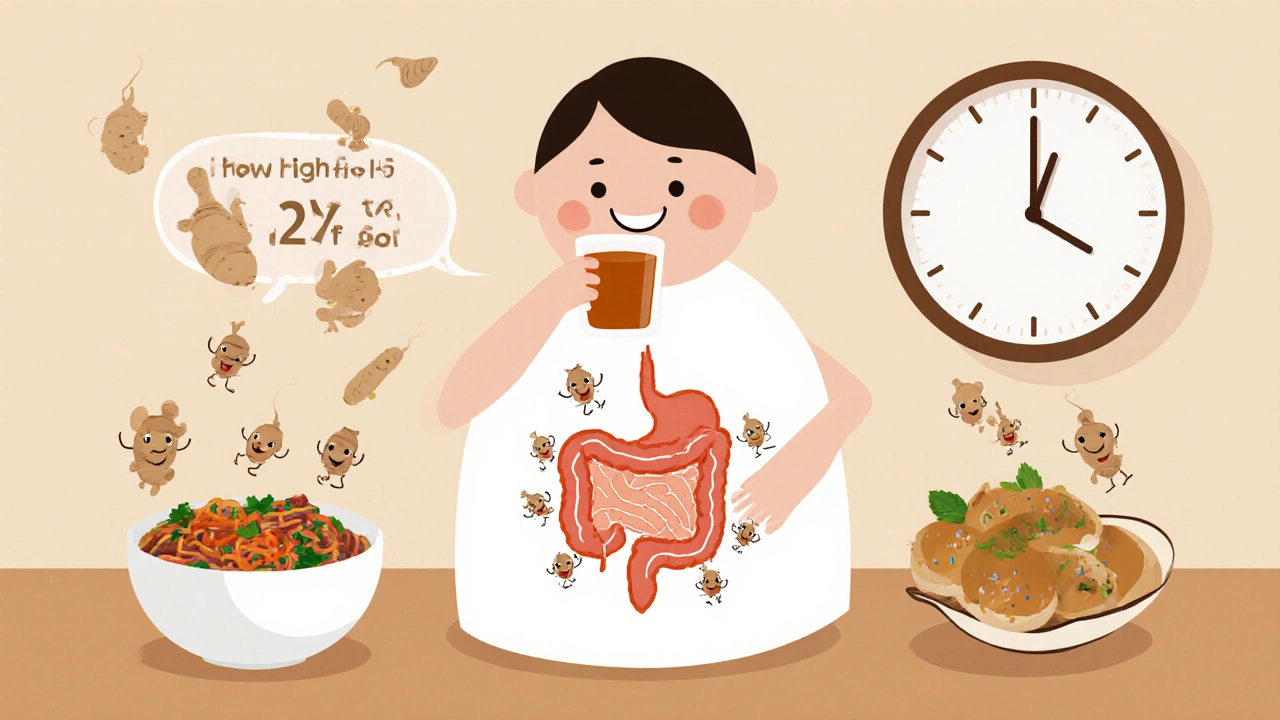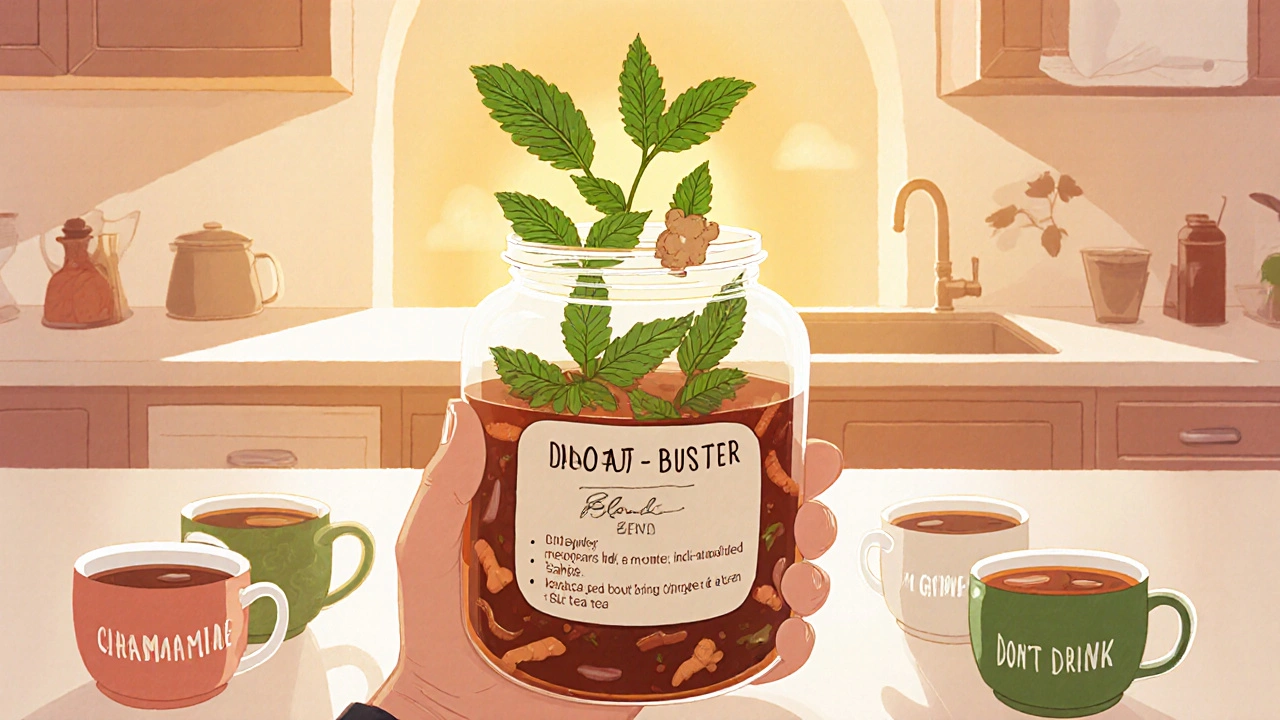Ever eaten a big meal and felt like your stomach turned into a balloon? You’re not alone. Bloating after eating is one of the most common digestive complaints - and it’s not just about overeating. It’s often caused by gas buildup, slow digestion, or sensitivity to certain foods. The good news? You don’t always need pills or fancy treatments. Sometimes, the answer is right in your teacup.
Why tea works for bloating
Tea isn’t just a warm drink. Many herbal teas have compounds that help relax your digestive tract, reduce inflammation, and speed up the movement of gas through your system. Unlike antacids that just mask symptoms, these teas work with your body’s natural processes. Studies show that compounds like menthol in peppermint and carminative oils in fennel can reduce abdominal pressure and bloating within 30 to 60 minutes after drinking.What makes tea especially useful is that it’s gentle. You can sip it after dinner without worrying about side effects. It’s not a cure-all, but for mild to moderate bloating, it’s one of the most reliable natural tools you’ve got.
Peppermint tea: The gas buster
Peppermint tea is the most researched herbal tea for bloating. Its active ingredient, menthol, acts as a natural antispasmodic - meaning it calms the muscles in your gut. When those muscles relax, trapped gas moves more easily, and the uncomfortable pressure eases.A 2019 clinical review of 12 studies found that peppermint oil (the concentrated form of what’s in peppermint tea) significantly reduced bloating and abdominal pain in people with IBS. While tea has lower concentrations than capsules, drinking a strong cup - steeped for 8 to 10 minutes - delivers enough to make a noticeable difference.
Best way to use it: Drink one cup 20 to 30 minutes after eating. Don’t use it if you have acid reflux, as it can relax the lower esophageal sphincter and make heartburn worse.
Green tea: The gentle digestif
Green tea isn’t just for antioxidants. It contains catechins, which help reduce inflammation in the gut lining and improve gut motility. Unlike black tea, it has less caffeine, so it’s less likely to irritate a sensitive stomach.Research from the University of Tokyo found that green tea extract helped normalize bowel movements in people with sluggish digestion. While it won’t blast away gas like peppermint, it helps your system work more efficiently - which means less buildup over time.
Tip: Choose loose-leaf or high-quality bagged green tea. Cheap tea bags often contain dust and lower-quality leaves with fewer active compounds. Steep for 3 to 4 minutes in water just under boiling - hotter water makes it bitter and can destroy beneficial compounds.
Ginger tea: The warming stimulant
Ginger has been used for thousands of years in traditional medicine to settle upset stomachs. Its secret? Gingerols and shogaols - compounds that speed up gastric emptying and reduce fermentation in the intestines, which is a major cause of gas.A 2022 double-blind study published in the Journal of Gastroenterology showed that participants who drank ginger tea after a high-fat meal digested food 25% faster than those who drank a placebo. Faster digestion = less time for gas to form.
Make it strong: Slice a 1-inch piece of fresh ginger root, crush it lightly with the side of a knife, and steep in boiling water for 10 minutes. Add a squeeze of lemon if you like. Avoid powdered ginger - it’s less potent and often mixed with fillers.

Fennel tea: The ancient gas reliever
Fennel seeds have been used in Indian and Middle Eastern kitchens for centuries to combat bloating after heavy meals. The seeds contain anethole, a compound that relaxes intestinal muscles and reduces spasms.One small study from the University of Tehran found that fennel tea reduced bloating in 78% of participants within an hour. It’s especially helpful if your bloating comes with cramping or a feeling of fullness even after eating small portions.
How to brew: Crush 1 teaspoon of fennel seeds with a mortar and pestle, then steep in hot water for 10 minutes. Strain and sip slowly. You can also buy pre-ground fennel tea bags, but whole seeds retain more oil and flavor.
Chamomile tea: The calming aid
Chamomile doesn’t just help you sleep - it’s also a quiet hero for bloating. It contains apigenin, a flavonoid with anti-inflammatory and antispasmodic effects. It’s gentle enough for kids and pregnant women (with doctor approval), and it helps calm the nervous system, which often gets tied up in digestive stress.Chamomile is best for bloating that comes with anxiety or stress-related digestion. If you feel bloated after a stressful lunch or dinner, chamomile helps break that cycle. It won’t blast gas away, but it reduces the body’s reaction to it.
Use it: Steep a tea bag or 1 tablespoon of dried flowers for 5 to 7 minutes. Avoid brands with added flavors - stick to pure chamomile.
How to choose the right tea for your bloating
Not all bloating is the same. Here’s how to match the tea to your symptoms:- Gas and pressure → Peppermint or fennel
- Slow digestion, feeling full too long → Ginger or green tea
- Cramping with bloating → Fennel or chamomile
- Bloating after stress or anxiety → Chamomile
- General post-meal discomfort → Try a blend of peppermint, ginger, and fennel
Don’t force yourself to drink one type if it doesn’t sit well. Taste matters - if you hate the flavor, you won’t drink it regularly. And consistency is what makes the difference.

What not to do
Some habits make bloating worse - even if you’re drinking tea.- Don’t chug tea hot and fast - gulping air while drinking adds more gas.
- Avoid iced tea - cold liquids can slow digestion and tighten gut muscles.
- Don’t use tea as a substitute for medical care - if bloating is constant, painful, or accompanied by weight loss or diarrhea, see a doctor.
- Don’t overdo it - more than 3 cups a day of strong herbal tea can lead to upset stomach or interact with medications.
When to expect results
For most people, the first cup of the right tea brings relief within 20 to 45 minutes. You’ll feel the pressure ease, the tightness loosen. But if bloating happens daily, tea alone won’t fix the root cause. You might need to look at your diet - carbonated drinks, beans, cruciferous veggies, or artificial sweeteners like sorbitol can be hidden triggers.Keep a food and symptom journal for a week. Note what you ate, when you felt bloated, and which tea helped. Patterns will show up fast.
Tea blends you can try
If you’re not sure where to start, try a pre-made blend. Look for ones with these ingredients:- Peppermint (30%)
- Fennel (25%)
- Ginger (20%)
- Chamomile (15%)
- Lemon balm (10%)
Brands like Traditional Medicinals, Yogi, and Pukka offer reliable options. Check labels - avoid ones with added sugars or artificial flavors.
Or make your own: Mix equal parts dried peppermint, fennel, and ginger. Store in a sealed jar. Use 1 tablespoon per cup of boiling water. Steep 10 minutes. Strain. Sip slowly.
Final tip: Timing matters
Drinking tea before a meal can help prep your digestive system. But if you’re already bloated, wait 20 to 30 minutes after eating. That gives your stomach time to start digesting before you introduce something that relaxes your gut. Too early, and you might slow digestion. Too late, and you miss the window of relief.Keep a mug of your favorite tea near your dinner table. Make it part of your routine - not a fix, but a ritual. Because sometimes, the best remedy isn’t the strongest one. It’s the one you actually use.
Can I drink tea for bloating while pregnant?
Yes, but with caution. Chamomile, ginger, and fennel teas are generally considered safe in moderation during pregnancy - no more than 1 to 2 cups per day. Avoid large amounts of peppermint tea, as it may relax the uterus too much. Always check with your doctor before starting any new herbal routine.
How long should I steep herbal tea for bloating?
For maximum benefit, steep herbal teas for 8 to 10 minutes. This allows enough time for the active compounds to fully release into the water. Shorter steeps (under 5 minutes) won’t deliver enough potency. Don’t over-steep beyond 15 minutes - it can make the tea bitter and increase the risk of stomach upset.
Is black tea good for bloating?
Not really. Black tea has higher caffeine and tannins, which can irritate the gut lining and slow digestion in sensitive people. While it’s fine in small amounts if you tolerate it well, it doesn’t have the same gas-relieving properties as peppermint, ginger, or fennel. Stick to herbal teas if bloating is your main concern.
Can tea cure chronic bloating?
No. Tea helps manage symptoms, but it doesn’t cure underlying conditions like IBS, SIBO, food intolerances, or gut dysbiosis. If you’re bloated every day, even after avoiding trigger foods and drinking tea, it’s time to see a gastroenterologist. Blood tests, breath tests, or stool analysis may be needed to find the real cause.
Should I drink tea hot or cold for bloating?
Always drink it warm or hot. Cold liquids can contract your digestive muscles and slow down digestion, making bloating worse. Heat helps relax the gut and improves circulation to the digestive organs. Even in summer, sip your tea at body temperature or slightly warmer.


Ankita Sinha
Just tried the fennel tea after a heavy curry night and wow. No more balloon belly. I make it with crushed seeds and a pinch of black salt - works like magic. Been doing this for years, and no pill has ever helped like this.
November 18, 2025 AT 21:38
Bette Rivas
There’s a lot of solid science here, especially around peppermint’s antispasmodic effects and ginger’s impact on gastric emptying. But I’d add a caveat: individual microbiome differences mean what works for one person might do nothing for another. I’ve seen patients with SIBO react poorly to peppermint despite it being labeled ‘safe’ - it can overstimulate bacterial fermentation in some cases. Always consider gut flora balance before committing to daily herbal use. Also, quality matters. Many commercial teas use steam-distilled extracts or dried leaves with low volatile oil content. Look for organic, whole-leaf, and preferably ethically sourced brands. The difference in efficacy is measurable.
November 20, 2025 AT 06:09
Greg Knight
For anyone who’s tried these teas and still feels bloated, don’t give up - just tweak your approach. I used to drink ginger tea right after dinner and got zero results. Then I started sipping it 20 minutes before eating instead. Changed everything. Your gut needs a heads-up, not a fire extinguisher. Also, chew your food like your life depends on it - 30 chews per bite. Sounds ridiculous, but it reduces the workload on your stomach and cuts gas production by half. It’s not magic, it’s mechanics. Try it for a week. You’ll be shocked.
November 21, 2025 AT 05:50
Jeff Moeller
Tea is just a ritual that lets us pretend we’re in control of our digestion. The real issue? We eat too fast, too much, and too often. No herb can fix a culture that treats food like fuel and not a sacred act. Sit down. Breathe. Chew. That’s the real remedy. The tea? Just the excuse to pause.
November 21, 2025 AT 08:14
prasad gali
While the study references are decent, the clinical relevance is overstated. The 2022 ginger study used 1g of powdered extract in capsule form - not tea. The concentration in tea is orders of magnitude lower. Also, the Tehran fennel study had n=18. This is anecdotal evidence dressed as science. Don’t confuse correlation with causation. If you want real relief, test for food intolerances via IgG panels or elimination diets. Tea is placebo with benefits.
November 23, 2025 AT 08:06
Herbert Scheffknecht
What if bloating isn’t about what you drink but what you’re avoiding? The real gas comes from suppressed emotions - stress, guilt, unexpressed anger. Ginger warms the belly because it warms the soul. Peppermint cools the system because it cools the mind. We treat digestion like a plumbing problem when it’s really a psychological one. The tea doesn’t fix your gut - it gives you a moment to stop running from yourself.
November 24, 2025 AT 17:39
darnell hunter
As someone who has read every peer-reviewed paper on herbal gastroenterology, I must say this article is dangerously oversimplified. The menthol concentration in brewed peppermint tea is 0.05% to 0.1%, whereas clinical efficacy requires 0.2% to 0.4%. The author ignores pharmacokinetics, bioavailability, and dose-response curves. This is pseudoscience dressed as wellness advice. If you’re serious about bloating, consult a gastroenterologist and get a hydrogen breath test. Not a teapot.
November 25, 2025 AT 15:10
Tara Stelluti
So basically you’re telling me to drink hot water with leaves instead of just admitting I have a broken gut? I’ve tried all these teas. I’ve bought the fancy bags. I’ve steeped them for 12 minutes. I’ve meditated before drinking them. Nothing. My stomach still looks like I’m 7 months pregnant after a slice of pizza. This is just another way to make people feel guilty for not being ‘well enough’.
November 26, 2025 AT 04:30
Hannah Machiorlete
Ugh I hate how everyone acts like tea is the answer. I’ve been bloated for 3 years. I’ve tried every tea. I’ve done keto, low FODMAP, probiotics, acupuncture. Nothing. And now you’re telling me to crush fennel seeds like some kind of witch? I’m not here for your spiritual belly rituals. I just want to wear jeans again.
November 28, 2025 AT 04:24
Abdula'aziz Muhammad Nasir
From Nigeria, I can confirm: our traditional ginger and hibiscus mix after heavy meals works just as well. We don’t need fancy labels. Just fresh root, hot water, and patience. The science is beautiful, but the wisdom has always been in the kitchen. Respect your body, not the brand.
November 28, 2025 AT 12:30
Tyrone Luton
Tea doesn’t cure bloating. It reveals it. You don’t feel the gas until you sit still long enough to notice it. That’s the real gift - not the menthol, not the gingerols, but the silence. The pause. The cup in your hands. The world stops. And for the first time in days, you’re not chasing, consuming, or numbing. You’re just… there. With your belly. And maybe that’s the only cure that ever really works.
November 30, 2025 AT 08:37